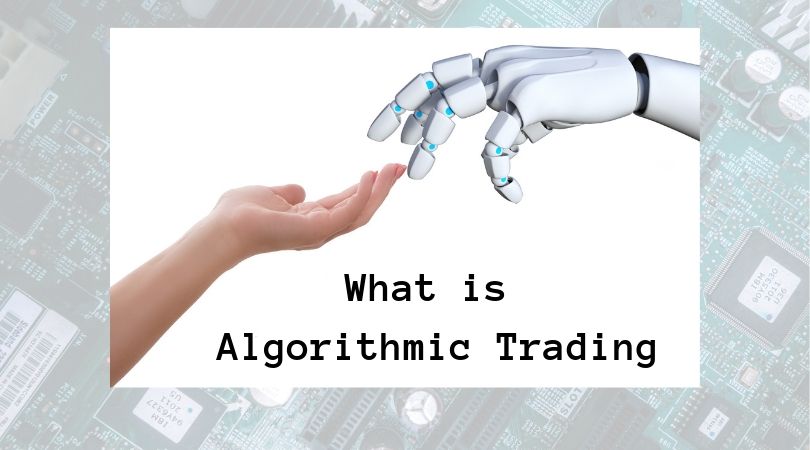What is Algorithmic Trading ?
- 1 June 2019 | 1703 Views | By Mint2Save

With the influx of technology, the whole world is running on algorithms and computers. Then why should the stock trading be left behind? Algorithms in trading and stock market have completely revolutionized the way trades are placed. With the use of advanced programs and high-speed internet, even a millisecond gain can lead to millions in profit! This is where algorithmic trading comes into play, so let’s dig a little deeper and get to know what is algorithmic trading all about!
In A Nutshell
Algorithmic trading, also known as automated trading or algo trading or black box trading is basically a marriage of financial knowledge and Computer-Based trading programs. Here pre-coded computer programming is used to set trades in the stock exchange.
In the 21st century, where everything is digitized and replaced by computers, stock trading is being digitized by the use of modern programs which replaces the human aspect of it. Modern-day trading programs, workstations, analytics are effectively replacing the human who used to be the brains behind everything and did all the work of placing the orders with the stock exchange. Now these programs can be customized suiting to the needs of the client and it can do virtually whatever the client demands. It can place orders instantly and more reliably than human with much less downtime. Essentially, if the coding behind the program is correct then the program will achieve all the desired objectives without any faults.
How Does This Work?
Through the use of algorithmic trading, you can do almost anything and everything on a stock exchange. Just punch in your requirements, like for example if you want to buy XYZ stock at a specific price, you then punch in the desired price in the system and the program automatically monitors the desired stock. As soon as it hits the price entered in the program it instantly places the order for buying it. The same process goes for selling where you enter the details and the program handles the rest. It is much better than human intervention as it is much faster and more reliable in placing orders at the stock exchange.
There are of course different algorithms that judge the market conditions in their own peculiar way, learn and adapt to perform better.
Benefits of Algorithmic Trading
Historically, there are tons of evidence available wherever a computer or a machine replaces a human, the process results in being more efficient, faster and more reliable. Applying the same dynamics to the area of stock trading. Algorithms and programs in trading have the following benefits:
- Best Prices: Trades are executed at the best possible prices, which are derived from the stock’s past performance, performance of the company,
- Error free: Almost zero probability of manual error as the machine executes exact trades.
- Unaffected by human conditions: Algorithms and programs cover inherent issues of human which can be fatigue, manual error, emotional breakdowns, etc. Algorithms are less prone to fatigue they can run in a loop forever
- Enables faster decision making: Algo trading can be back tested using historical and real-time data to see if it is a viable trade. This task can take human hours or even days of work, which could lead to loss of precious time as decisions are required to be taken in the markets in split second. A machine can do multitasking hence programs can be coded in such a way that they can check for multiple market conditions in real time and give detailed analytical reports.
- Speed: Trades/Orders can be placed instantly and quicker than a human being manually executing a trade.
- Better opportunities: Integration of artificial intelligence and machine learning can create infinite opportunities in the stock market.
Are Machines Really Taking Over The Markets?
The answer to the question really depends on who you ask. But recent articles and investment letters put out by top rated brokers such as Goldman Sachs seem to suggest that machines and trading algorithms are in fact taking over. Large Hedge Funds such as Blackrock have recently begun investing heavily in Stock Picking Strategies which are driven by Algos. Have you considered deploying an Algorithmic Trading System to take advantage of this new trend?
You don’t have to invest in a Hedge Fund, Family Office or Commodity Trading Pool to take advantage of this change in investment styles. You can actually deploy an Algorithmic Trading Solution through an NFA Registered Broker, utilising one of the Trading Algorithms.
However a few concerns that shadow benefits of algorithmic trading are also there, such as:
(a) Impact of Rumours and Fake News
(b) Software Imperfections
(c) Hacking and Other Security Concerns
(d) Complacency towards Risk Measurement: A lot of investors were of the view that equity trading, when becomes algorithmic, becomes almost immune towards market risks and losses are minimised. Algorithmic trading, though more aligned towards better results, is not free from the substantial market risks. Hence, the necessity of risk disclosure becomes more important, with advises such as past performance not being indicative of future performance, to be thoroughly elaborated.
What are the different algorithmic trading strategies?
There are basically 4 broad strategies that are used in the market today
1. Momentum-Based strategies
These are made according to the circumstance or we can even call them as spur of the moment based strategy. Assume that there is a particular trend in the market. As an algo trader, you are following that trend. Further in the given situation let us assume that the markets fall within the week. Now, you can use statistics to determine if this trend is going to continue or not. Or if it will change in the coming weeks. Accordingly, you will make your next move. You have based your algorithmic trading strategy on the market trends which you determined by using statistics. The investment decision based on following of trends is called Momentum-based Strategy. It is generally short term based and more profitable for shorter trades.
Why Momentum works?
There is a long list of behavioral biases and emotional mistakes that investors exhibit and make due to which momentum works. However, this is easier said than done as trends don’t last forever and can exhibit swift reversals when they peak and come to an end.
Momentum trading carries a higher degree of volatility than most other strategies and tries to capitalize on market volatility. In this kind of practice it is very important to time the buys and sells correctly to avoid losses by using proper risk management techniques and stop losses. Momentum investing requires regular monitoring and appropriate diversification to safeguard against such severe crashes.
2. Arbitrage Algorithmic Trading Strategy
Arbitrage is basically taking advantage of different pricing in the market. This is generated by the acquisition which is a corporate event. If you are devising to invest based on the pricing inefficiencies that may occur during a corporate event (before or after), then you are using an event-driven strategy. Bankruptcy, acquisition, merger, spin-offs etc. could be the event that drives such kind of an investment strategy. These arbitrage trading strategies can be market neutral and used by hedge funds and proprietary traders widely.
3. Statistical Arbitrage Algorithmic trading strategy
When an arbitrage opportunity arises because of misquoting in prices, it can be very advantageous to the algorithmic trading strategy. Although such opportunities exist for a very short duration as the prices in the market get adjusted quickly. And that’s why this is the best use of algorithmic trading strategies, as an automated machine can track such changes instantly.
4. Market making strategy
According to Wikipedia: “A market maker or liquidity provider is a company, or an individual, that quotes both a buy and sell price in a financial instrument or commodity held in inventory, hoping to make a profit on the bid-offer spread, or turn.”
Market making strategy provides liquidity to those securities which are not frequently traded on the stock exchange. The market maker can boost the demand-supply equation of securities.
The Future – Machine Learning In Tradingon
In Machine Learning based trading, algorithms are used to anticipate the range for very short-term price movements at a believing confidence interval. The advantage of using Artificial Intelligence (AI) is that humans develop the initial software and the AI itself develops the model and improves it over time with every strategy.
A large number of funds rely on computer models built by data scientists and quants but they’re usually static, i.e. they don’t change with the market. Machine Learning based models, on the other hand, can analyze large amounts of data at high speed and improve themselves through such analysis, making every trade more profitable, accurate and reliable than the previous one! That is why the whole world today is gaga over Machine learning, especially the investment community as computers can without any bias make correct predictions which are reliable.
As per Alec Ross’s book “The Industries of the Future”, out of the 7 billion trades that take place in the US equity markets, 2/3rd are already via algorithmic trading based processes. The book also interviews fintech experts who claim the present technology used in finance to be antique in nature and in desperate need of innovation.
Being in resonance with the aforementioned opinion and in order to capture more profits due to market movements, big market players such as JP Morgan Chase, HSBC, RBS etc., have set up their own programming department in cognisance with the market trends. These firms are actively involved in developing algorithms that not only enable the trader to fetch best market returns, but also evolve themselves with time to adapt to changing market conditions.
To the common man, though algorithmic trading seems a far fetched idea, which might be a decade or two away. However, it is exactly the opposite. Many new age tech startups have successfully raised fundraisers to bring algorithm based investment as accessible as a grocery shop next door.
It is certainly clear now that science has met a conjecture with finance and now, an increasing number of computer engineers are being deployed in the field of finance. Lucrative offers with higher pay, exciting career paths has certainly attracted many a technocrats to the world of finance.
For a technocrat in the world of finance, the following are the usual job roles related to algorithmic trading:
(a) Strategy Development
(b) Backtesting and Optimisation
(c) Trading
(d) Performance Reporting
(e) Trade Analytics
(f) Risk Management
(g) Charting
(h) Discretionary Trading
(i) Connectivity
(j) Tech Support
(k) Data Management
(l) Security Management
Hence, algorithmic trading does has a lot in bag for technocrats craving into the field of finance.
We are looking at data scientists, data engineers and business intelligence consultants and similar new designations being more and more common each day.
This field is yet to uncover many dimensions, which necessarily do not limit themselves to equity based markets, but also real estate, foreign currency market, and others.









